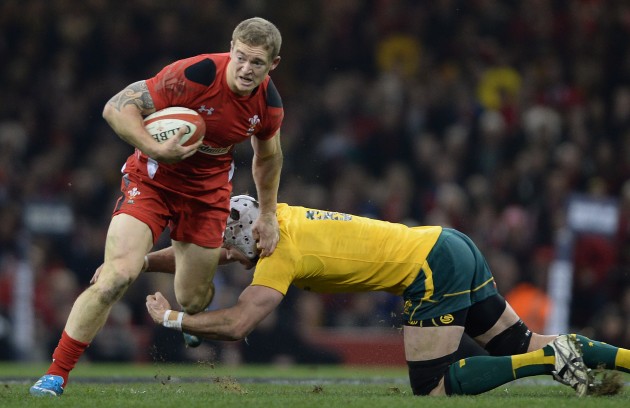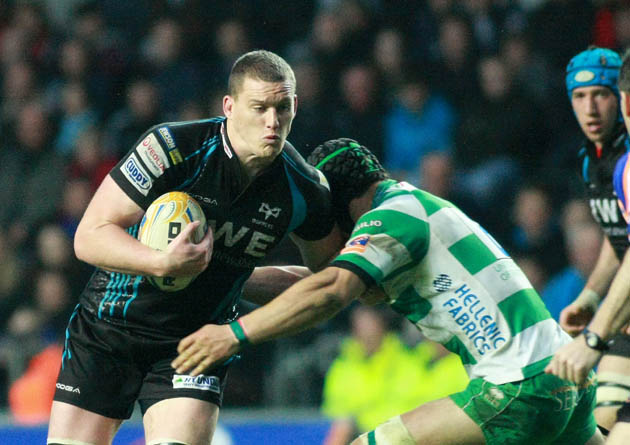Goodwill abounds for Owen Williams, the Participation Agreement deadline passes, Ian Evans heads over the Severn Bridge and an improved Wales are all covered
Owen Williams
Owen Williams sustained a significant spinal cord injury whilst playing at the inaugural World Club 10s competition. You’ll often hear people refer to an event as ‘putting things in perspective’. An event which makes the trivial concerns seem just that. Owen’s injury was one of those instances. It was genuinely upsetting to see such a player rich with promise and a fine young man too, suffer such cruel misfortune.
Owen’s accident drew support from all around the globe with fans and players taking to social media. The hashtag #staystrongforows dominated rugby timelines and illustrated the deep concern that people have for Owen. Thankfully, he has now returned to Wales with his family, where he will continue his rehabilitation. Good luck, Owen. Everyone is behind you.
Participation agreement ends
Welsh rugby has been playing ‘countdown’ with the Participation Agreement (P.A.) for quite a while. But June saw the ticking finally come to an end. Leaving Welsh rugby with a real conundrum.
I’ll leave you to solve it – SHTISTOMR
Without the P.A. Welsh rugby could fall into chaos in a very short space of time – even more chaos, if that’s possible. The PA is Welsh rugby. It is the foundation on which all regional rugby and test rugby is run in Wales. It dictates release dates for test players, Welsh player quotas, remuneration for the regions and this time round may even include the allocation of centrally contracted players. Rumours suggest that the new PA is close to being finalised in the coming weeks. Fingers and toes crossed.
Lower League restructures
You could be forgiven for thinking that Welsh rugby’s problems are limited to the elite game. But no. Welsh rugby has many problems, on many levels – so much so that it would be a perfect sponsorship fit for NCP car parks. The most recent of which has been the restructuring of Wales’ lower leagues. June saw the passing of the new structure by a vote of 61% (70% of those eligible voted). But whilst it is undoubtedly positive that a resolution has been found; some remain unconvinced.
The restructure will see reduced travelling to away games for certain clubs, lowering travel costs – which are a major headache for smaller clubs. However concerns have been raised that the restructure will also see teams from lower divisions pitted against teams from higher divisions – the possible difference in quality, size and fitness of the opposition leading to demoralising margins of defeat and potentially posing an injury risk. It will be interesting to see if the experiment works.
The 2nd test was a commercial win for Wales
Wales’ performance in the Second Test was vitally important for Wales – but not just on the field. The commercial impact of the performance will have made the Autumn International fixtures a far easier sell – and Welsh rugby needs every penny that it can get.
Pushing tickets, advertising space and corporate boxes is hard enough in the current climate – selling them to punters who think that Wales are unable to compete with the big three from the southern Hemisphere, would be a tall order. Wales’ display in the second test would have undoubtedly pleased Warren Gatland, Rob Howley, and Robyn McBryde – but it will also have brought a Cheshire cat sized-smile to the face of the WRU’s commercial team.
Bristol sign Ian Evans
June saw Bristol RFC announce yet another marquee signing in Ian Evans. It was yet another enormous show of power and wealth from Bristol and has added to what is essentially an AVIVA Premiership squad. However, whilst Evans’ signing was lauded in the West Country it was met with jeers and boos from Wales.
But why? You can’t blame Ian Evans for signing a lucrative contract at the age of 29 – especially with his injury record. You can’t blame Bristol for using their substantial player budget to lure the best playing talent available, particularly at this late stage in June. And you also can’t blame Sean Holley for using his relationship with his former players – that’s what good coaches do. If you’re looking to point the finger – point it at the delayed Participation Agreement. If the extra money that is rumoured to be part of the new deal had been allocated to the regions earlier they would have been more able to be more competitive in the transfer market.








